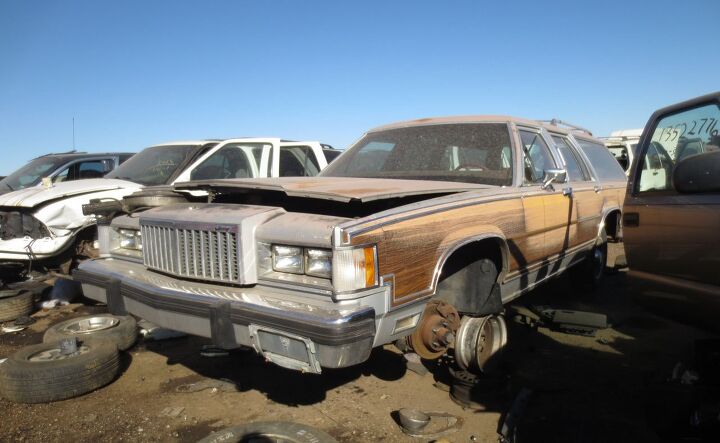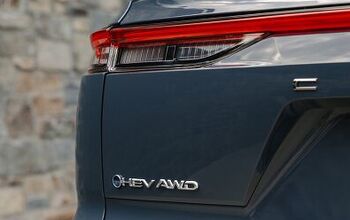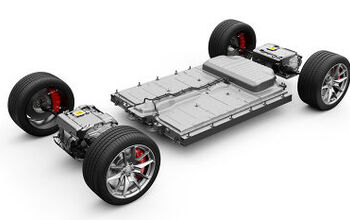Junkyard Find: 1985 Mercury Grand Marquis LS Colony Park Station Wagon

The popularity of the full-size station wagon went into steep decline during the course of the 1980s, thanks to competition from minivans and less truck-ish SUVs, and there wasn’t a particularly compelling reason to get a Mercury wagon instead of its near-identical, cheaper Ford sibling, so the 1979-1991 Mercury Grand Marquis Colony Park wagon was uncommon then and near-extinct now. I do see some Ford LTD Country Squires in wrecking yards nowadays— this ’86 woodie and this ’87 woodie, for example— but this Colony Park is the first I’ve seen in at least a decade.
This generation of Colony Park wasn’t quite as majestic as its 1950s and 1960s predecessors, but it also got about twice as many miles per gallon as those barges.
The good old familiar 302-cubic-inch Windsor V8, still fitted with a carburetor in 1985, powered this wagon.
Opera lights!
This fender trim has a very maze-like shape.
Are there little speakers in the steering wheel, or are those holes merely decorative?
The Colorado sun has not been kind to these leather seats.
The Grand Marquis kicked some Buick and Oldsmobile butt, to hear Mercury tell it.

Murilee Martin is the pen name of Phil Greden, a writer who has lived in Minnesota, California, Georgia and (now) Colorado. He has toiled at copywriting, technical writing, junkmail writing, fiction writing and now automotive writing. He has owned many terrible vehicles and some good ones. He spends a great deal of time in self-service junkyards. These days, he writes for publications including Autoweek, Autoblog, Hagerty, The Truth About Cars and Capital One.
More by Murilee Martin
Latest Car Reviews
Read moreLatest Product Reviews
Read moreRecent Comments
- Kjhkjlhkjhkljh kljhjkhjklhkjh [h3]Wake me up when it is a 1989 635Csi with a M88/3[/h3]
- BrandX "I can charge using the 240V outlets, sure, but it’s slow."No it's not. That's what all home chargers use - 240V.
- Jalop1991 does the odometer represent itself in an analog fashion? Will the numbers roll slowly and stop wherever, or do they just blink to the next number like any old boring modern car?
- MaintenanceCosts E34 535i may be, for my money, the most desirable BMW ever built. (It's either it or the E34 M5.) Skeptical of these mods but they might be worth undoing.
- Arthur Dailey What a load of cow patties from fat cat politicians, swilling at the trough of their rich backers. Business is all for `free markets` when it benefits them. But are very quick to hold their hands out for government tax credits, tax breaks or government contracts. And business executives are unwilling to limit their power over their workers. Business executives are trained to `divide and conquer` by pitting workers against each other for raises or promotions. As for the fat cat politicians what about legislating a living wage, so workers don't have to worry about holding down multiple jobs or begging for raises? And what about actually criminally charging those who hire people who are not legally illegible to work? Remember that it is business interests who regularly lobby for greater immigration. If you are a good and fair employer, your workers will never feel the need to speak to a union. And if you are not a good employer, then hopefully 'you get the union that you deserve'.























































Comments
Join the conversation
With the towing package and Trac Loc rear axle, these drove like sport sedans. I had two of these as project cars, '87 and '90 and they drove better than average full sizers. But rust, gas prices, and unemployment killed the dream of keeping them longer.
Where was this.. I need that back seat lol